Tragic pages in the history of Cyprus: "Bloody Christmas" and Operation Attila
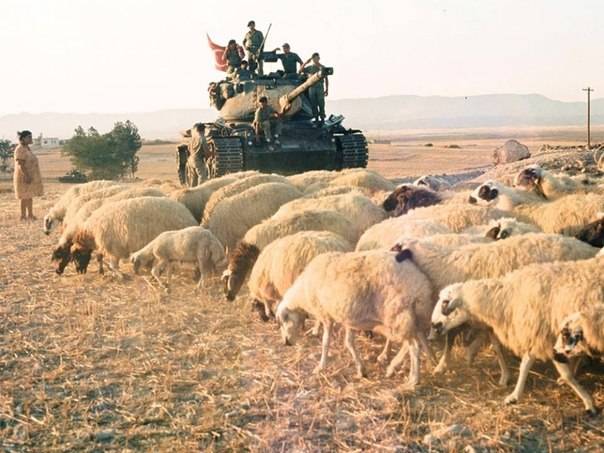
Today we will talk about the tragic events on the island of Cyprus in 1963-1974, which frightened the leaders of socialist Bulgaria very much and pushed them to carry out the notorious "Renaissance Process" campaign in this country.
The Island of Cyprus: A Brief History from 1571 to 1963
The geopolitical position of Cyprus is unique. The distance from it to the coast of Turkey is only 70 km, to Syria - a little more than 100 km, to Lebanon - a little more than 150 km, Israel is about 300 km from this island, to Egypt about 400 km, to Greece - 950 km. There are few islands in the eastern part of the Mediterranean Sea, all the more so large: the size of Cyprus is such that it makes it possible to create a good separate state here.
Not surprisingly, Cyprus has attracted the special attention of all the superpowers that have ever existed in the Mediterranean and even beyond. And the British, having recognized Cyprus as independent, never left it, leaving behind two large military bases - Akrotiri and Dhekelia, occupying 3% of the island's territory.
This island belonged to Turkey since 1571, when it was captured from Venice under Sultan Selim II. Since then, a large Muslim diaspora has emerged there, consisting not only of ethnic Turks, but also of Greeks, Genoese and Venetians who converted to Islam. Since 1878, after the conclusion of the Cyprus Convention (a secret Anglo-Turkish treaty on a "defensive alliance" directed against Russia), the British, who formally belonged to Turkey, were completely ruled by the British, who annexed it after the outbreak of World War I, already in 1914. In 1923 Cyprus officially became part of the British Empire.
After the end of World War II, the ideas of Enosis (the movement of the Greeks for reunification with historical homeland). In Greece, the ideas of the annexation of Cyprus were treated more than favorably. In March 1953, at a secret meeting in Athens, where Cyprus was represented by Archbishop Makarios III, the country's top leaders approved a plan to fight the British, which included not only peaceful protests and diplomatic pressure, but also the methods of guerrilla warfare. Colonel Georgios Grivas, who fought with the Bulgarians in World War I, with the Turks in the Greco-Turkish 1919-1922, with the Italians during World War II, was to be responsible for the military operations. The British from the Special Operations Directorate, with whom he collaborated as the leader of one of the underground groups in occupied Greece, gave him the following description:
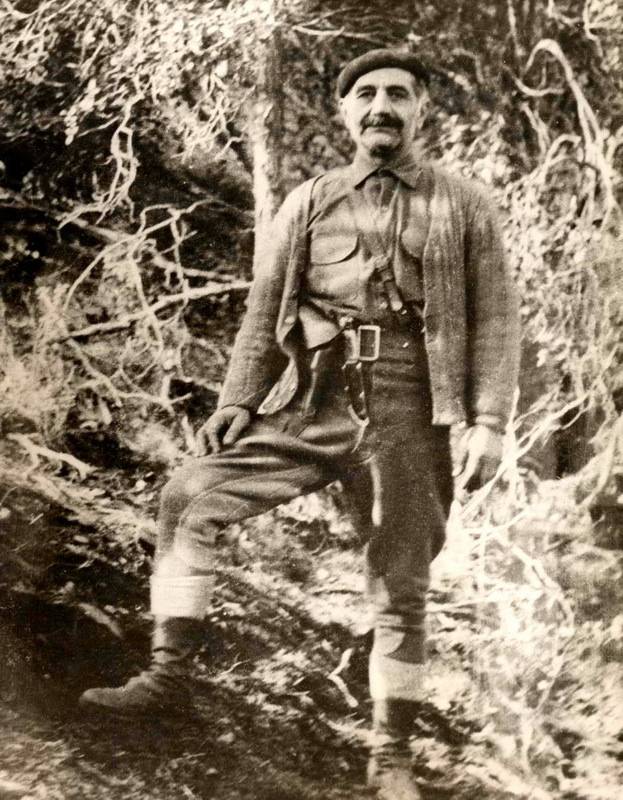
Colonel Georgios Grivas
And Cyprus broke out: numerous rallies, actions of disobedience and attacks on the British and their supporters led to the fact that on November 24, 1954, a state of emergency was declared on the island. The retaliatory repression, which the Greek press was constantly writing about, greatly damaged the international image of the British. Their fight against demonstrators and insurgents is now more and more often compared with the actions of the fascists Mussolini and the Nazis of Hitler, at the suggestion of the Greeks, and in some newspapers, the British governor Harding was called the Gauleiter of Cyprus. Somehow coping with the anti-colonial movement of Cypriots on the island itself, the British were clearly losing the information war outside its borders.
In the end, the British decided that two large military bases on this island would be enough for them, and in 1960 agreed to grant independence to Cyprus. But it turned out that the victory did not bring Cyprus any closer to reunification with Greece, because the Muslims living on the island categorically did not want this. While the British ruled the island, Christians and Muslims somehow found a common language on the basis of universal hatred of the "colonialists and occupiers." Now representatives of different confessions have the opportunity to pay more attention to their neighbors who are of different faiths, who, moreover, have completely different views on the future of Cyprus. The Greeks dreamed of Enosis, most of the Turkish Cypriots supported the idea of Taksim - dividing the island into two parts: Greek and Turkish.
By that time, the proportions of the island's population were as follows: Orthodox Greeks - 80%, Muslim Turks - 18%, people of other confessions and nationalities - 2% (among them were Lebanese Maronites, Armenians, British settled here).
Ethnic map of Cyprus 1955. Here you can also see the British military bases of Akrotiri and Dhekelia:
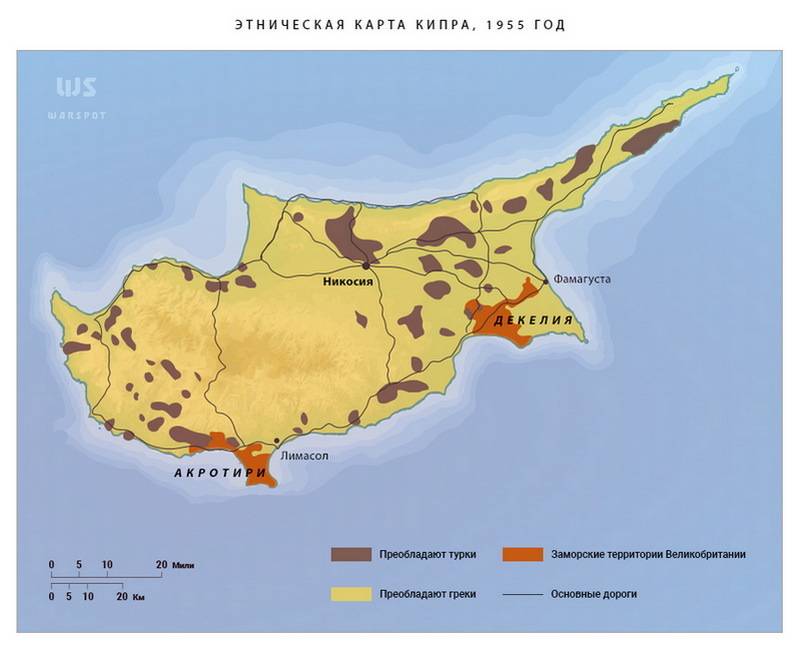
The first president of Cyprus was Archbishop Makarios III, the vice-president was Fazil Kucuk, who back in 1944 created the Cyprus National Party of the Turkish People.
Archbishop Macarius, First President of the Republic of Cyprus, and Vice President Fazil Kucuk:
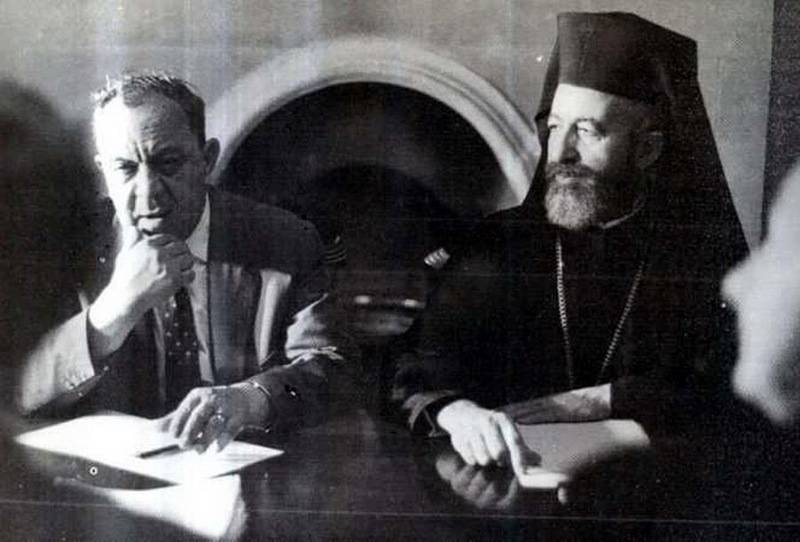
"Bloody Christmas" 1963
The first major outbreak of violence on the island of Cyprus occurred in December 1963. Mass attacks by the Greeks on the Turks in Nicosia, Larnaca and 104 villages were later called "Bloody Christmas".
In the early morning of December 21, 1963, Greek police stopped a taxi in Nicosia with Turks returning from guests and tried to search the women in the car. Muslim men obstructed them, a fight broke out, and the police used weapon... Hearing the sounds of gunfire, people began to run out of the surrounding houses, and soon the situation finally got out of control.
This ridiculous incident was the beginning of a bloody conflict that engulfed Nicosia, Larnaca and 104 villages. On the afternoon of December 21, groups of armed Greeks drove around Nicosia in cars, shooting at all the Turks indiscriminately. The Turks fired back, taking up positions on the rooftops and at the windows of houses, as well as on the roof of the Saray Hotel and on the minarets. Riots soon swept across Cyprus and Muslims were attacked in their homes throughout the island. In a few days, 364 Turkish Cypriots and 174 Greeks were killed. A great international resonance was caused by the message about the attack by the Greeks on one of the hospitals in Nicosia, in which more than 20 patients of Turkish origin were allegedly shot. The Greeks issued a denial, claiming that only two patients of this hospital were then shot by a "lone psychopath" and one more died of a heart attack during these events. Which of the parties in this case should be believed is impossible to say now.
The number of Muslim refugees was enormous: in Greece it is believed that there were 9 thousand of them, the Turks say 25 thousand. Some Christians were also forced to flee - about 1200 Armenians and 500 Greeks. Many abandoned houses (both Christian and Muslim) were plundered, some of them were burned (to exclude the possibility of the return of the owners). According to official UN data, voiced in the report of the Secretary General of this organization on September 10, 1964, the number of looted houses was 2000, destroyed and burned - 527.
On December 30, 1963, Greece, Great Britain and Turkey signed an agreement on the division of Nicosia into Turkish and Greek enclaves, and in 1964 UN peacekeepers were introduced to Cyprus.
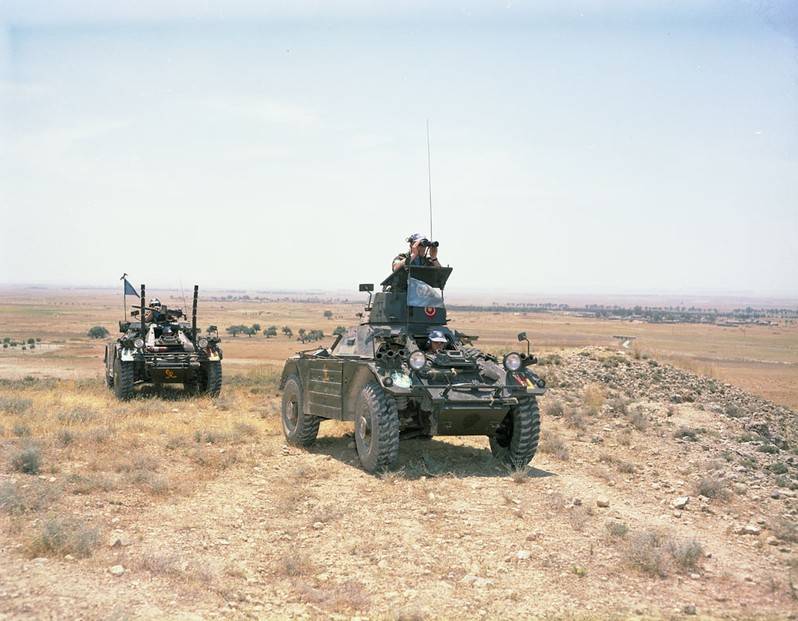
Canadian peacekeepers on the island of Cyprus, 1964
The events of December 1963 are still celebrated by Turkish Cypriots as “the week of memory and martyrdom of 1963-1974”. And in the school textbooks of the Greek Cypriots, these events are called "Turkish rebellion" and "a period of aggression by Turkey and Turkish Cypriots against the Greeks."
In 2004, the President of the Greek part of Cyprus, Thassos Papadopoulos, even stated that from 1963 to 1974. not a single Turkish Cypriot was killed. These words have been called a lie even in Greece and South Cyprus.
The bloody standoff in Cyprus in 1974
With the arrival of the peacekeepers, interethnic and interfaith problems on the island of Cyprus have not disappeared at all. In addition, the Greeks themselves were divided, the radical part of whom was no longer satisfied with the "compromising" position of the President-Archbishop Makarios, who was now accused of making concessions to the Muslims.
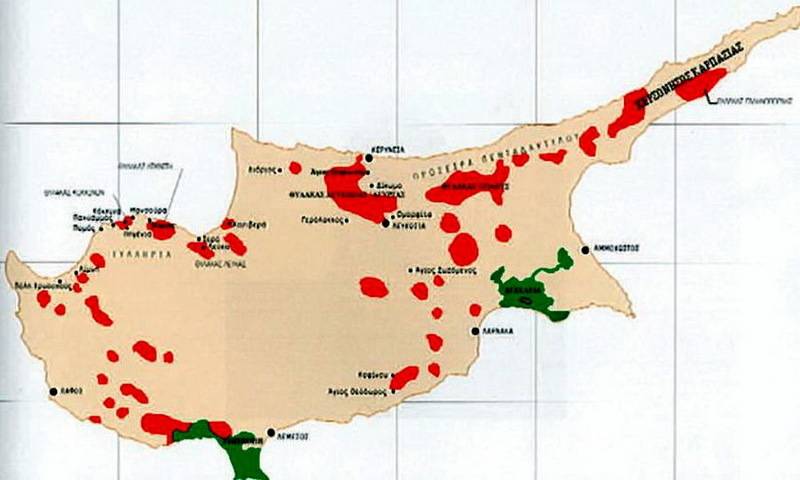
Areas of Cyprus inhabited by Turks in 1974
The nationalist group EOKA, created in the mid-1950s as anti-British, was now ready to shed blood (both their own and that of others) in the name of Enosis's ideas. The leader of this organization, Georgios Grivas, already familiar to us, enjoyed the support of the “black colonels” in the Greek government, and after his death in January 1974, EOKA completely came under the control of the Metropolitan special services and Dimitris Ioannidis, one of the leaders of the Junta.
On July 15, 1974, a coup d'etat was organized by the radicals, in which the National Guard of Cyprus and units of the Greek army took an active part. The Cyprus News Agency informed everyone about the events of that day:
The main goal of the coup was declared to be "restoring order in the country." It was also announced that the President of Cyprus Makarios was dead, but in fact he flew to London.
The ousted and declared dead President Makarios was replaced by Nikos Georgiadis, better known by his journalist pseudonym "Sampson". This employee of The Cyprus Times and an active member of EOKA began with the murders of British and collaborators, photographs of whose corpses he later posted on the pages of his publication. On this occasion, he joked: they say, I always find myself "the first reporter at the scene." It was thanks to his activities that Ledra Street in the old town of Nicosia was named the Death Mile.
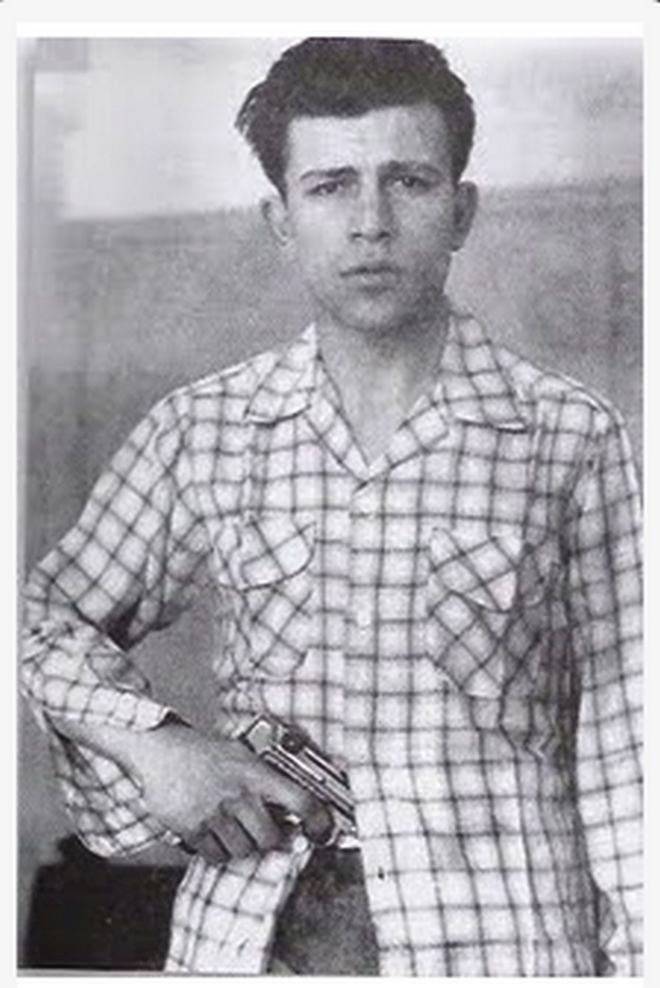
Fighter against British imperialism Nikos Georgiadis (Sampson)
The same Grivas recalled:
Nikos was twice sentenced to death, but pardoned after the 1959 Zurich-London Agreement, the first step towards Cyprus' independence. Returning to his homeland in 1960, he began to publish the newspaper "Mahi" ("Struggle"), at that time he met with the leader of Algeria Ahmed bin Bella and US President John F. Kennedy.
He took an active part in the events of Bloody Christmas in 1963, and in 1967 went into opposition to President Makarios.
But he had nothing to do with the 1974 coup, and even Ioannidis was surprised by his candidacy.
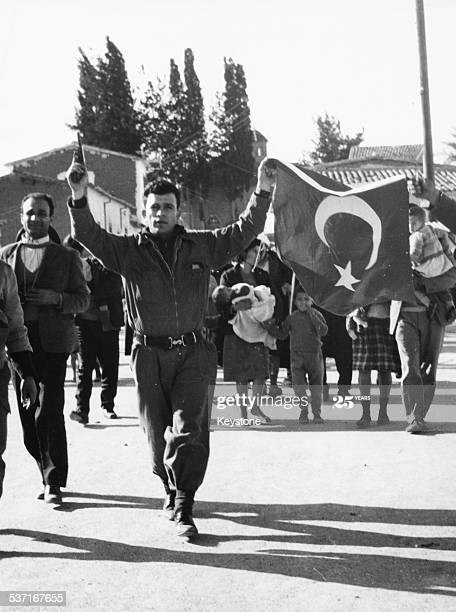
Nikos Sampson and his supporters with the captured Turkish flag, 1974
The President of Cyprus Nikos was destined to be only 8 days, but let's not get ahead of ourselves, because on the calendar we still have July 15, 1974, and Turkish warships and landing ships have not yet left the harbor of Mersin.
Operation Attila
The participation of the Greek army in the coup d'état in Cyprus opened the way there for the Turkish troops. As a justification for their military mission, the Turks presented a 1960 treaty, according to which Turkey was one of the guarantors of the independence of Cyprus. The Turkish government said that the objectives of the operation are to preserve the sovereignty of Cyprus, which is encroaching on Greece (the Greeks had nothing to offer such a trump card) and to maintain peace on the island. And for this, of course, it is necessary to provide assistance to the Turkish population of Cyprus and prevent its destruction - everyone remembered December 1963 very well, and neither the local Turks nor Ankara had confidence in the Greek Cypriots. However, in Greece, as you remember, there were completely different assessments of the events where the Turks acted as aggressors and rebels. And the armies of the two countries, each of which was a NATO member, now had to engage in battle on the long-suffering island.
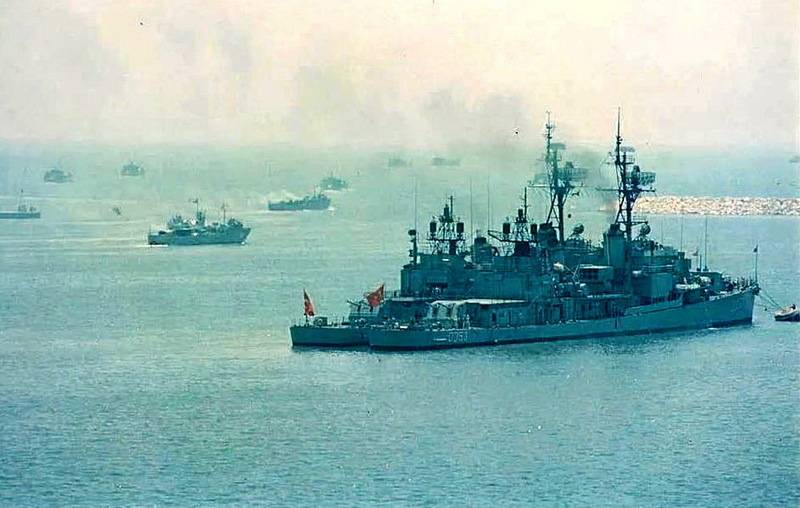
Combat and landing Turkish ships leave the harbor of the city of Mersin, July 19, 1974
The military operation of the Turkish army, during which the Greek fleet was defeated and the Greek landing troops that landed on the island were defeated, received the code name "Attila".
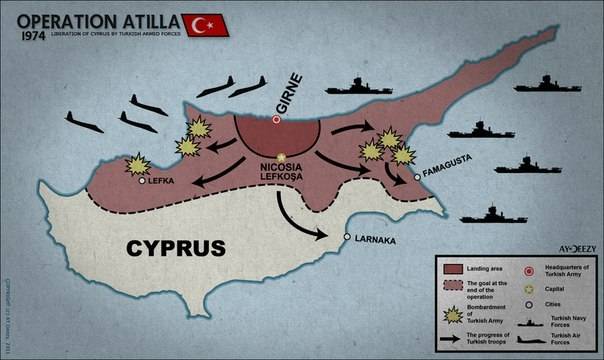
Operation "Attila" on the map
But in Turkey this formidable name is not in honor now: here they now prefer to call it more boring and dry - "Operation to maintain peace in Cyprus".
Turkish ships approached Cyprus on July 20, 1974, on that day 10 thousand soldiers and officers landed on Pantemili beach (in total, up to 40 thousand Turkish servicemen took part in Attila operation).
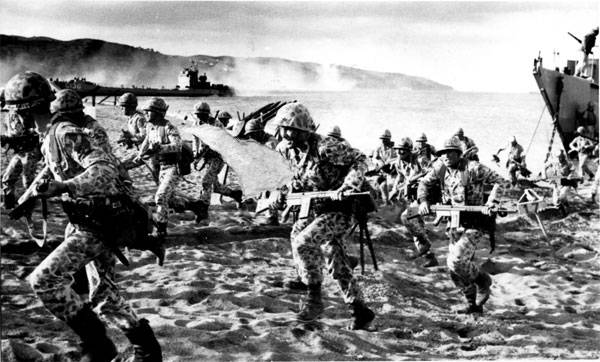
July 20, 1974: Turkish landing on Pentemili beach begins
The most epic battle of this war was the battle of 28 Turkish aircraft with three destroyers - also Turkish (!), Which took place on July 21. Turkish planes were sent to intercept Greek ships going to Cyprus from Rhodes. But they changed course, and in a given area were Turkish destroyers, carrying out fire support for the landing near Kyrenia. And here the descendants of the Hellenes were not at a loss: openly on the radio they thanked the crews of "the Greek ships that arrived in time." True, Turkish flags were raised on the "Greek ships" for some reason, but everything could be expected from these cunning and dishonest Greeks. The Turkish pilots happily attacked their ships, drowning one of them and seriously damaging the other two. On the ground near Kyrenia at that time there was a pilot of a previously shot down Turkish plane. Seeing how his comrades attack their own ships, he contacted them and reported that a terrible mistake had occurred. He was asked about the code word of the day and, when he named yesterday (the new was unknown to him), he was praised for his good knowledge of the Turkish language.
In general, the level of chaos in the brave Turkish troops was then no less than in the brave Greek army.
On July 22, the Turks lost one fighter in an air battle, but captured the Nicosia airport: in this battle, they exchanged five M47 Patton II tanks for several armored personnel carriers and two HS-121 passenger aircraft, which brazenly stood on the runway.
The next day, an armistice was concluded, which did not prevent the Greeks from burning two Turkish tanks, and the Turks from destroying three enemy artillery positions.
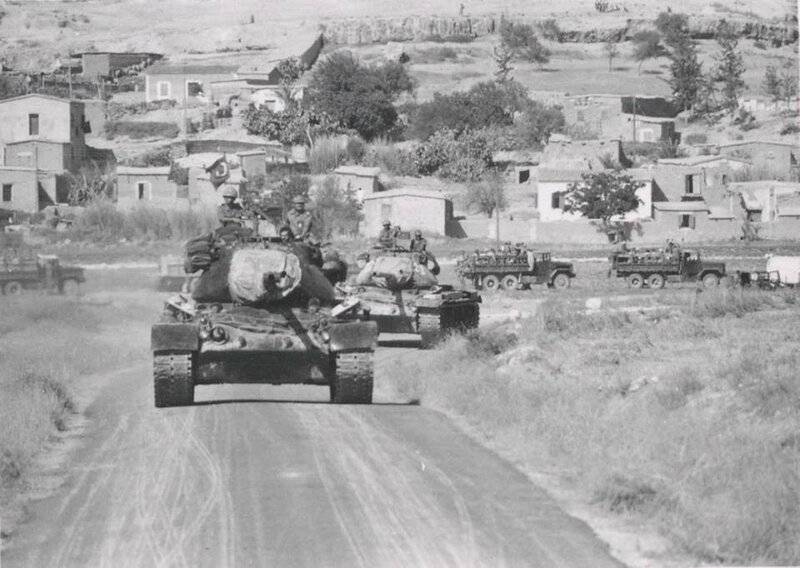
Turkish tanks M47 "Patton II", Cyprus, 1974
Despite the declared ceasefire, the Greek patriots amused themselves by hunting the Turks: from August 1 to August 6, 5 tanks and two armored personnel carriers were knocked out of ambushes using ATGMs.
On August 14, the second stage of hostilities began. 80 Turkish tanks M47 "Patton II" moved to Famagusta, with which Cypriot T-34-85 tanks entered the battle, which, by the way, showed themselves very well in those battles with superior enemy forces.
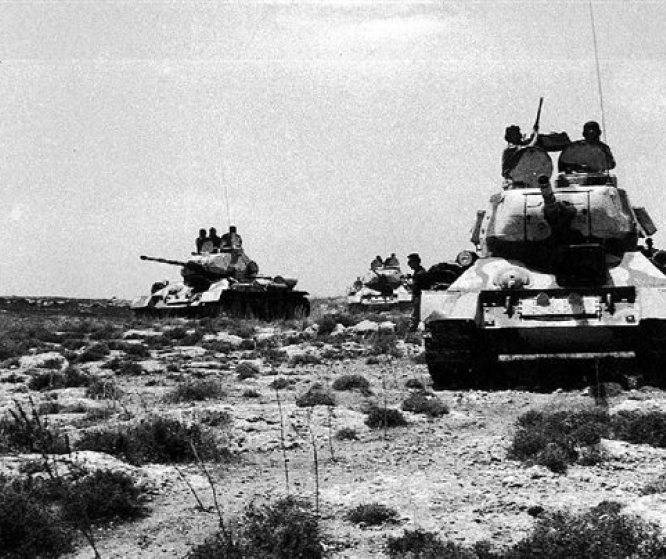
Greek tanks T-34-85, Cyprus, 1974 (32 Soviet tanks were purchased by Cyprus in 1964 and delivered in 1965 via Egypt)
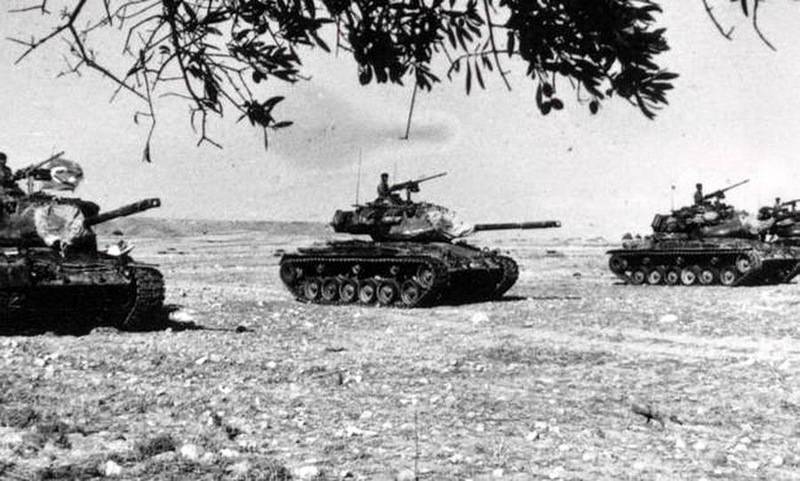
Turkish tanks M47 "Patton II" in their original positions, August 14, 1974
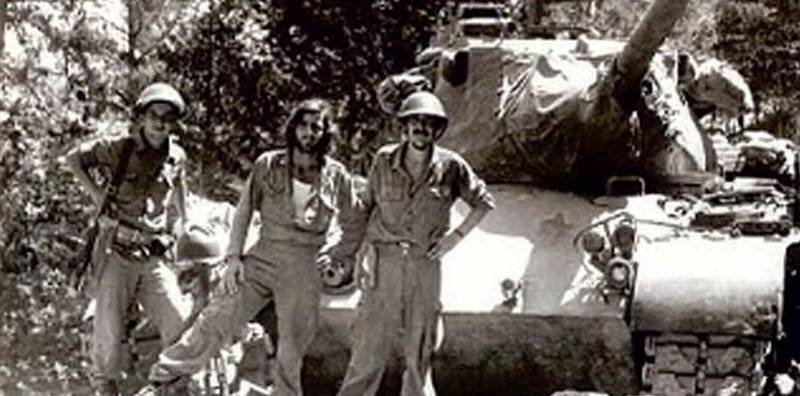
Greek soldiers next to a captured M47 Patton II tank
Despite the heroism shown by the Greeks in certain sectors of the front, by August 18, the Turks controlled 37% of the territory of Cyprus, but were forced to stop under UN pressure.
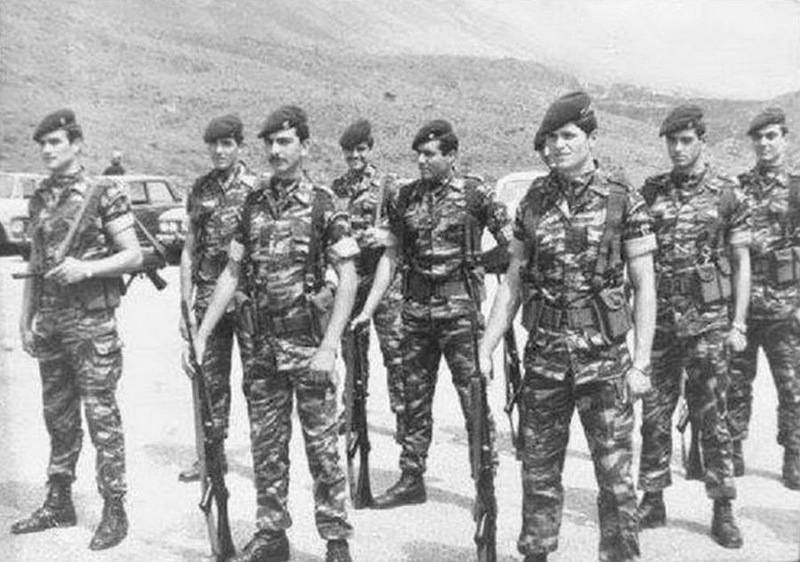
Turkish Cypriots greet their compatriots from the Metropolis, August 1974:
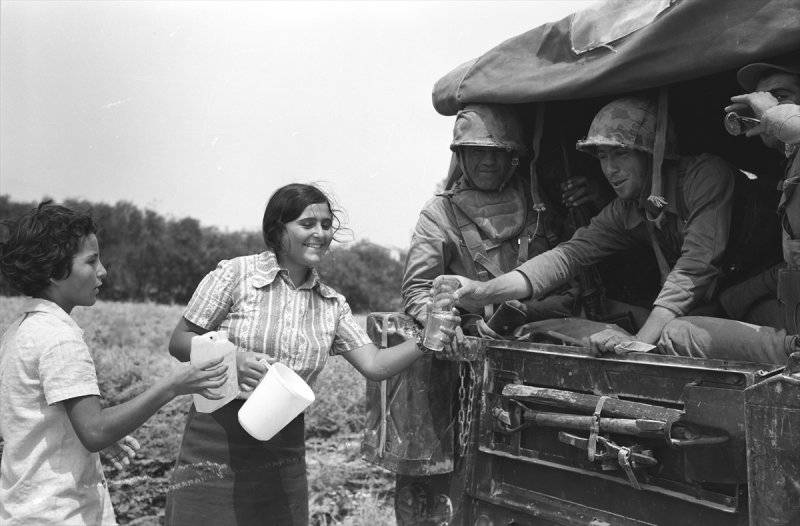
Turkish soldiers victorious:
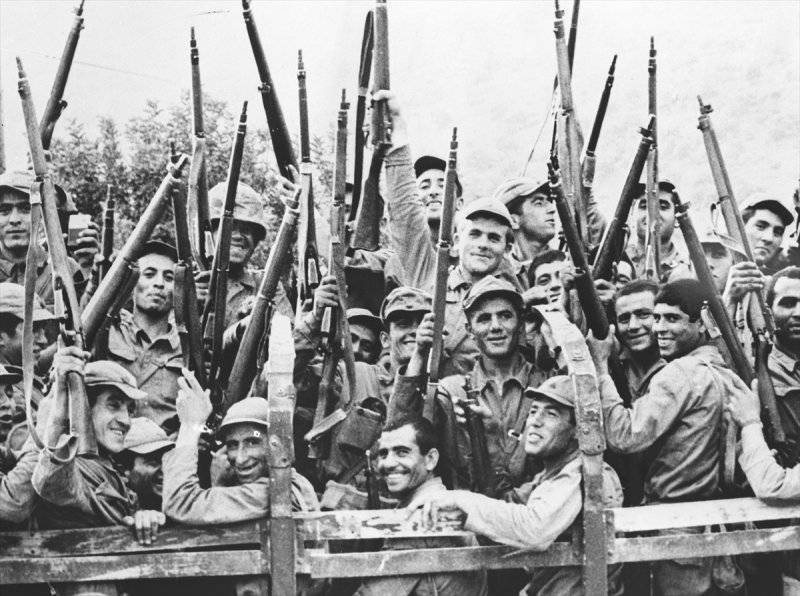
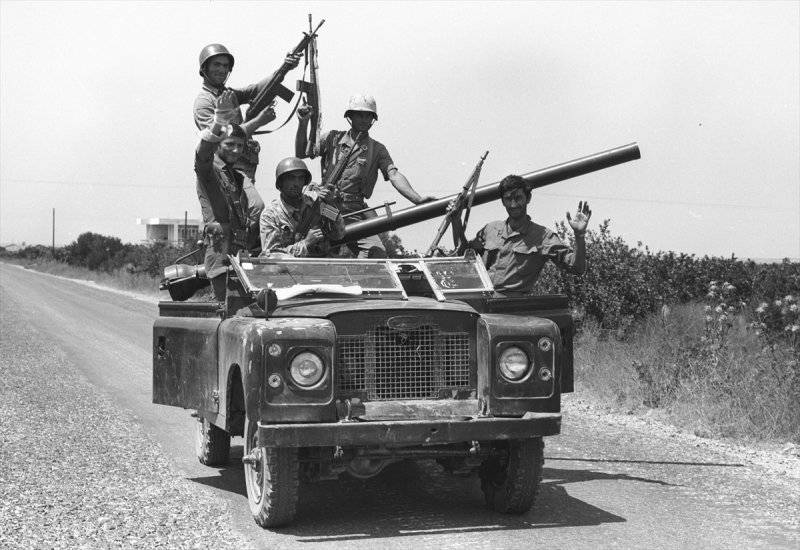
Loss data reported by different authors (especially Greek and Turkish) vary greatly. The following figures seem to be the most reliable: during the fighting on the island, the losses of Turkish soldiers amounted to 498 people, the Turkish Cypriots lost 70 soldiers and 270 civilians killed by the Greek military during the retreat. The losses of Greece turned out to be an order of magnitude greater - about 4 soldiers and officers. According to various estimates, from 000 to 1974 thousand Greeks fled to the south of the island in 140, and from 200 to 42 thousand Muslims to the north.
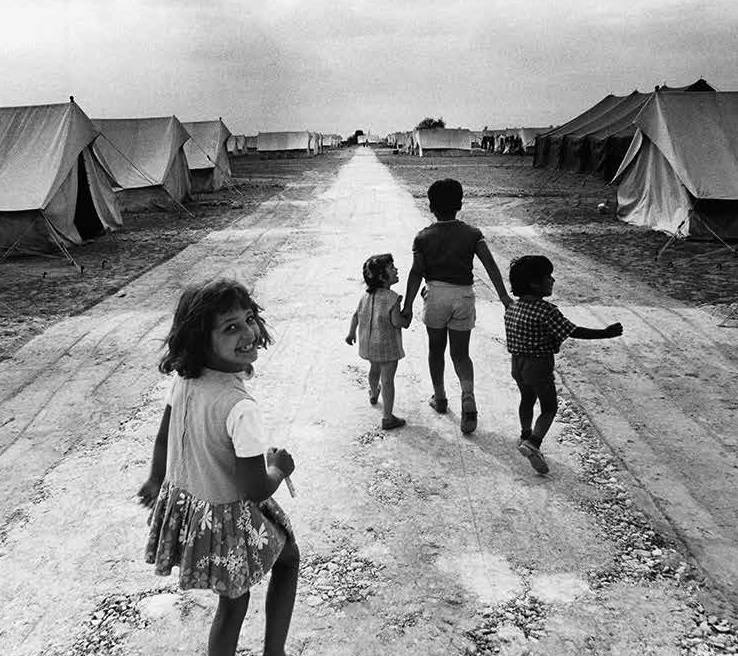
Jean Mohr. Greek children in a refugee camp, Cyprus, 1974
This catastrophe led to the fall of the government of the "black colonels" in Greece, the leaders of the junta - Papadopoulos, Ioannidis, Makarezos and Pattakos, were arrested and sentenced to life imprisonment. In the north of Cyprus, the unrecognized UN-Cypriot Turkish federal state was created (since November 15, 1983 - the Turkish Republic of Northern Cyprus).
Most strikingly, the Greek Court of Appeal, upon the conclusion of the war crimes case against the "black colonels" on March 21, 1979, issued a judgment (no. 2558/79) justifying Turkey's intervention:
In 2001, a Cyprus v. Turkey lawsuit was filed with the European Court of Human Rights. The decision in this case was made only on May 12, 2014: Turkey was ordered to pay 30 million euros in compensation for moral damage to the relatives of the missing people and 60 million euros in compensation for moral damage suffered by the Greek Cypriots living on the Karpas Peninsula. The Turkish authorities gave an example of how to treat the decisions of this strange judicial body that offend national dignity and limiting sovereignty: they calmly declared that its decisions were not binding.
In the next article we will talk about the impression made by the described events on the leadership of socialist Bulgaria, the "Cyprus Syndrome" by Todor Zhivkov, the infamous "Renaissance Process" campaign and the "Great Excursion" of the Bulgarian Turks.
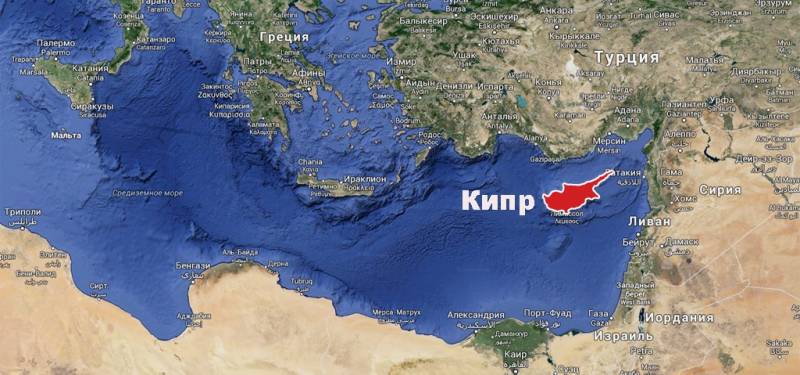
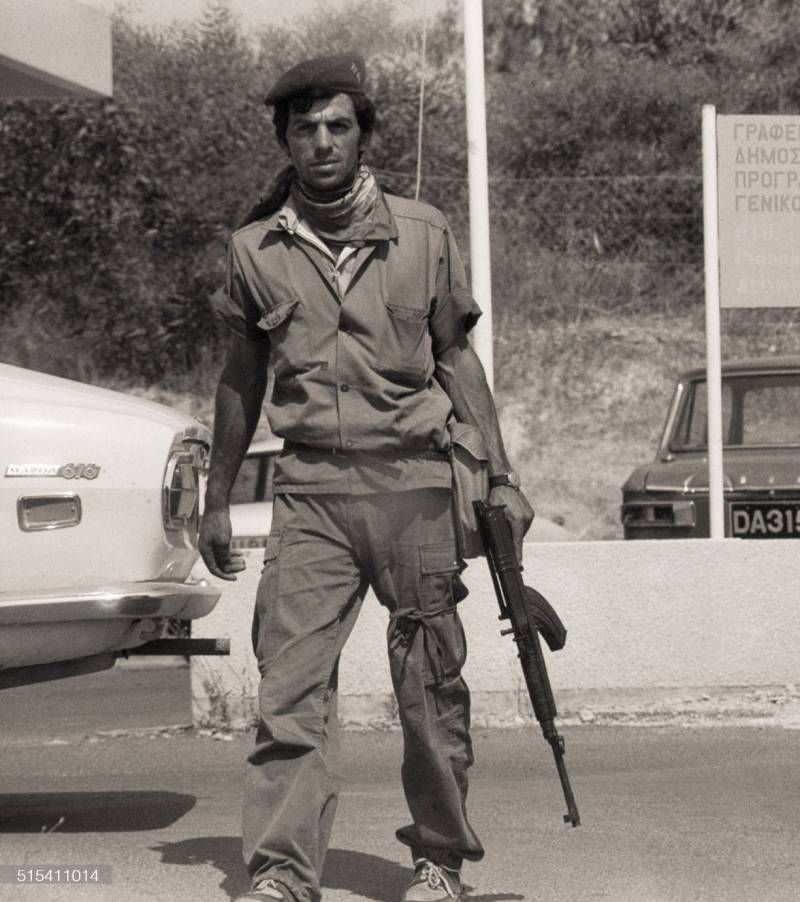

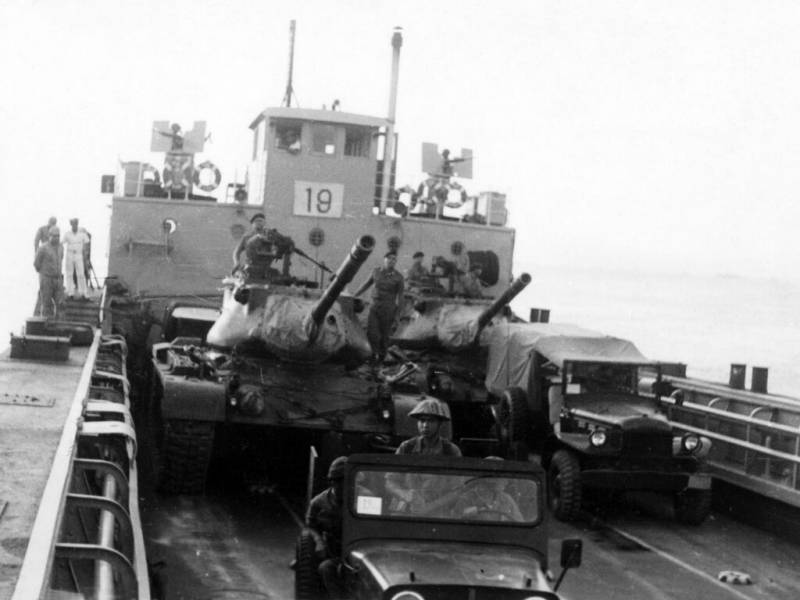
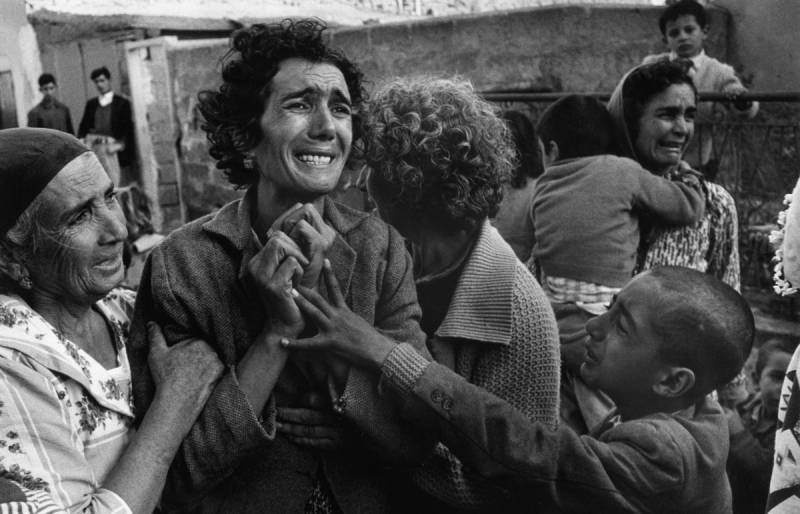
Information